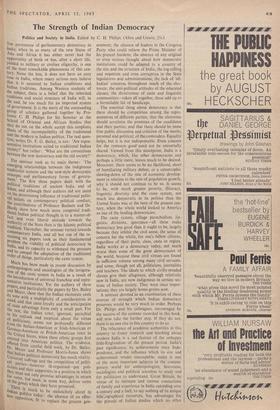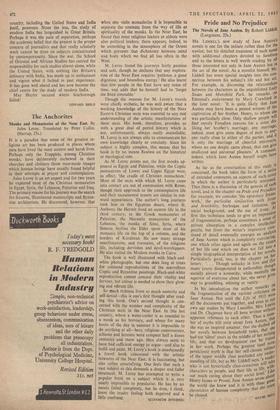The Strength of Indian Democracy
C. H. Philips. (Allen and Unwin, 25s.)
Politics and Society in India. Edited by THE persistence of parliamentary democracy in India, when in so many of the new States of Asia and Africa it has either never had the oPportunity of birth or has, after a short life, Yielded to military or civilian oligarchy, is one Of the most remarkable phenomena of this cen- turY. None the less, it does not have an easy time in India, where many serious men believe that it is unsuited to Indian conditions and Indian traditions. Among Western students of the subject, there is a belief that the inherited traditions and social structure of India will, in the end, be too much for an imported system of government. It is the merit of the outstanding group of scholars gathered together by Pro- fessor C. H. Philips for his Seminar at the School of Oriental and African Studies •that they do not on the whole accept this simplistic thesis of the incompatibility of the traditional and the modern in Indian politics. The real ques- tion, writes Dr. F. G. Bailey, is not : 'Are repre- sentative institutions suited to traditional Indian s°cietY?' but rather; 'What are the connections between the new democracy and the old society?'
The seminar took as its main theme: The emerging relationships between the indigenous traditional systems and the new-style democratic concepts and parliamentary forms of govern- ment.' The 'first three papers dealt with the political traditions of ancient India and of I4-am, and although their authors did not insist On the determining influence of traditional politi- cal beliefs on contemporary political conduct, the contributions of Professor Basham and Dr. "lardy show how much more congenial tradi- tional Indian political thought is to a matter-of- fact and even liberal attitude towards the authority of the State than is the Islamic political tradition. Thereafter, the seminar turned towards contemporary India, and all but one of the re- maining six papers took as their fundamental Problem the viability of political democracy in India, and its capacity to withstand the pressure and to compel the adaptation of the traditional order of things, particularly the caste system. Much has been made in recent discussion by anthropologists and sociologists of the invigora- tion of the caste system in India as a result of the introduction of universal franchise and repre- sentative institutions. Yet the authors of these Papers, and particularly the papers by Drs. Bailey 1.1t1 Meyer, show that the Indian electorate casts itt. vote with a multiplicity of considerations in nio.:Ind, and that caste loyalty and the anticipation the caste advantage form only a small part. For ,ne rest, the Indian voter, ignorant, parochial 'il his outlook and sceptical about the virtue o ,.rt Politicians, seems not profoundly different /oin the Italian-American or Irish-American or c erman-American or Polish-American voter in th
United States, when these ethnic groups first entered th
tered into American Politics' The evidence' ffrered from careful field work, by Dr. Bailey, Dr. Meyer and Professor Morris-Jones shows that Indian ndian political democracy has much vitality. ersal suffrage and the competition of politi- cal Parties---however ill-organised—put poli- ticians
ItaIrsitd their supporters in a position in which not only promise advantages in return tes, but must, in some way, deliver some I the goods which they have promised.
There isn
mch to be melancholy about in
or p fites today: the absence of an effec- 'eve opposition, fit to replace the present gov-
ernment; the absence of leaders in the Congress Party who could relieve the Prime Minister of his present burdens; the absence of any original or even serious thought about how democratic institutions could be adapted to a country of the size and the structure of India; the log-rolling and nepotism and even corruption in the State legislatures and administrations; the lack of `all- Indian' concerns throughout much of the elec- torate; the anti-political attitudes of the educated classes; the divisiveness of caste and linguistic communities—taken all together, these add up to a formidable list of handicaps.
The essential thing about democracy is that there should be competition among the repre- sentatives of different parties; that the electorate should scrutinise the promises of the candidates and their parties; and that there should be some free public discussion and criticism of the merits, personal and political, of the contenders. Equality helps, but it is not indispensable. Even concern for the common good need not be universally shared. Viewed from this standpoint, India is a democracy, which, like other democracies and perhaps a little more, leaves much to be desired. Moreover, there seems to be no likelihood, short of humiliating military defeat, or a catastrophic slowing-down of the rate of economic develop- ment in relation to the rate of population growth, why it should not continue to be so. It seems to be, with much greater poverty, illiteracy, linguistic diversity and the caste system, not much less democratic in its politics than the United States was at the turn of the present cen- tury, when the whole world looked to America as one of the leading democracies.
The caste system, village parochialism, lin- guistic divisions, ignorance—all these make democracy less good than it ought to be, largely because they inhibit the civil sense, the sense of concern for the whole, for one's fellow citizens, regardless of their party, class, caste or region. India works as a democracy today, not much worse than some of the great democracies of the world, because these civil virtues are found in sufficient volume among many civil servants. and some, though not all, politicians, journalists and teachers. The ideals to which civilly-minded classes give their allegiance, although relatively new in India, are now indigenous in certain sec- tions of Indian society. They were once impor- tations; they are largely home-grown now.
A seminar devoted to an examination of these sources of strength which Indian democracy possesses would be very much in order. Perhaps Dr. Philips and his colleagues, encouraged by the success of the seminar recorded in this book, will now take the further step. If they do not, there is no one else in this country to do so.
The reluctance of academic authorities in this country to foster research and teaching about modern India is a sad feature of the unhappy little-Englandisna of the present period. India's past significance, its achievements since Inde- pendence, and the influence which its size and achievement render inescapable, make it one of the most important subjects in the contem- porary world for anthropologists, historians, sociologists and political scientists to study and for politicians to understand. Great Britain, by virtue of its intimate and intense connections of family and experience in India extending over a century and a half, to say nothing of its unique bibi':ographical resources, has advantages for the pursuit of Indian studies which no other country, including the United States and India itself, possesses. None the less, the study of modern India has languished in Great Britain. Perhaps it was the pain of separation, perhaps the academic belief that the present is the proper concern of journalists and that really scholarly work cannot be done on subjects contaminated by contemporaneity. Since the war, the School of Oriental and African Studies has carried the responsibility for such studies almost alone, while the United States, with nothing like Britain's intimacy with India, has made up in enthusiasm and vigour what it lacked in past experience. It has gone well ahead and has now become the chief centre for the study of modern India.
May Hayter succeed where Scarborough failed!
EDWARD SH1LS



































 Previous page
Previous page